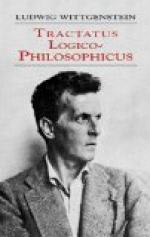6.342 And now we can see the relative position of logic and mechanics. (The net might also consist of more than one kind of mesh: e.g. we could use both triangles and hexagons.) The possibility of describing a picture like the one mentioned above with a net of a given form tells us nothing about the picture. (For that is true of all such pictures.) But what does characterize the picture is that it can be described completely by a particular net with a particular size of mesh. Similarly the possibility of describing the world by means of Newtonian mechanics tells us nothing about the world: but what does tell us something about it is the precise way in which it is possible to describe it by these means. We are also told something about the world by the fact that it can be described more simply with one system of mechanics than with another.
6.343 Mechanics is an attempt to construct according to a single plan all the true propositions that we need for the description of the world.
6.3431 The laws of physics, with all their logical apparatus, still speak, however indirectly, about the objects of the world.
6.3432 We ought not to forget that any description of the world by means of mechanics will be of the completely general kind. For example, it will never mention particular point-masses: it will only talk about any point-masses whatsoever.
6.35 Although the spots in our picture are geometrical figures, nevertheless geometry can obviously say nothing at all about their actual form and position. The network, however, is purely geometrical; all its properties can be given a priori. Laws like the principle of sufficient reason, etc. are about the net and not about what the net describes.
6.36 If there were a law of causality, it might be put in the following way: There are laws of nature. But of course that cannot be said: it makes itself manifest.
6.361 One might say, using Hertt:’s terminology, that only connexions that are subject to law are thinkable.




